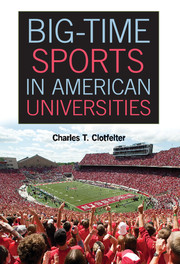Book contents
- Frontmatter
- Contents
- List of Figures
- List of Tables
- Preface
- Glossary of Abbreviations and Terms
- PART ONE COMMERCIAL SPORTS AS A UNIVERSITY FUNCTION
- PART TWO THE USES OF BIG-TIME COLLEGE SPORTS
- 4 Consumer Good, Mass Obsession
- 5 Commercial Enterprise
- 6 Institution Builder
- 7 Beacon for Campus Culture
- PART THREE RECKONING
- Appendix
- Notes
- References
- Index
4 - Consumer Good, Mass Obsession
from PART TWO - THE USES OF BIG-TIME COLLEGE SPORTS
Published online by Cambridge University Press: 03 May 2011
- Frontmatter
- Contents
- List of Figures
- List of Tables
- Preface
- Glossary of Abbreviations and Terms
- PART ONE COMMERCIAL SPORTS AS A UNIVERSITY FUNCTION
- PART TWO THE USES OF BIG-TIME COLLEGE SPORTS
- 4 Consumer Good, Mass Obsession
- 5 Commercial Enterprise
- 6 Institution Builder
- 7 Beacon for Campus Culture
- PART THREE RECKONING
- Appendix
- Notes
- References
- Index
Summary
Speaking about that other version of football, the one we Americans call soccer, famed Liverpool manager Bill Shankley once remarked, “Football's not a matter of life and death … it's more important than that.” This sentiment will be familiar to many Americans, those who make up the truest of the true fans of American college football and basketball teams. From the Nebraska supporter decked out in red from head to toe on a football Saturday to the East Lansing homeowner whose flagpole flies a green flag emblazoned with a white “S,” the most ardent followers of college teams constitute a class of consumers whose devotion to a brand makes them more zealots than mere customers. For them, demand is emphatically brand specific: the commodity is not simply college basketball; it is UCLA basketball, or Tennessee basketball. Like wild blackberries, this institution-specific devotion is out there, firmly rooted, ready for the picking. It was there before the current university leaders arrived, and it will be there after they leave office. It is a hearty perennial, requiring little maintenance. Each university with a history of competitive play can call upon this crop of fan devotion. Without this hearty consumer demand and the commercial value it creates, there would be no big-time college sports.
Not all the spectators and viewers of college games fall into this category of intensity, of course.
- Type
- Chapter
- Information
- Big-Time Sports in American Universities , pp. 69 - 93Publisher: Cambridge University PressPrint publication year: 2011



